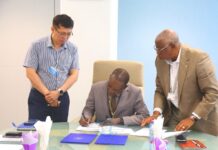The 12th Regional Conference of Heads of Anti-Corruption Agencies in Commonwealth Africa convened in Kigali, Rwanda, from May 3-7 under the theme: ‘Combating Corruption for Good Governance and Sustainable Development in Africa’.
The Conference was jointly organised by the Commonwealth Secretariat and the Government of Rwanda, and brought together members of the Association of Anti-Corruption Agencies in Commonwealth Africa, senior government officials, relevant international organisations, policy-makers, and development partners, to address key priorities toward the achievement of Sustainable Development Goal 16. They shared knowledge and good practices and discussed the impacts of corruption on sustainable development in Africa and innovative approaches in the fight against corruption.
Over the years, corruption has been an unerasable characteristic feature of African politics and business, from the Maghreb down to the Southern African Development Community, from the East African Community and the Horn of Africa across the Sahel region to the Atlantic coastal West African States.
Rwanda’s Prime Minister, Dr. Edouard Ngirente, in his opening remarks, pointed explicitly to the common fundamental fact that was in line with Africa’s Agenda 2063: ‘The Africa We Want’—aspiration number 3, which provides for an Africa of good governance, democracy, respect for human rights, justice and the rule of law.
“This clearly illustrates the firm commitment of African leaders to uphold the culture of the rule of law and good governance. Africa is making efforts toward improving good governance, although we still have a long way to go. African countries are committed to addressing corruption on the continent,” Ngirente said.
Most African countries have ratified African Union Convention on preventing and combating corruption and other international legal instruments on corruption. As required by international obligations, African countries have enacted national anti-corruption laws and established anti-corruption institutions. Almost every African country has a specialised anti-corruption agency to address specific crimes and malpractices including illicit flow, money laundering, embezzlement, conflicts of interest, among others.
Prime Minister Ngirente pointed to the conference several reports indicating that global corruption is now costing around US$1trillion annually, there are common causes of Africa’s corruption, and this is adversely impacting the lives of African people. Corruption creates economic distortions and hampers investments.
There are so many corruption-linked adverse effects. For instance, investors who deserve a fair and competitive business environment avoid investing in countries where there is a high level of corruption. Commonwealth Africa member-states can make a difference in this fight against corruption through strengthened cooperation and effective accountability mechanisms, he added.
The Commonwealth Secretary-General, Patricia Scotland, said: “Corruption is a serious threat to sustainable and equitable development. Every dollar lost to corruption is a dollar lost to investing in a child’s education, healthcare, or much-needed infrastructure. That is why the Commonwealth Secretariat has made preventing and countering corruption a top priority”.
But to do this, she suggested that: “Collaboration and cooperation between member-states are critical if we are to successfully meet the challenge of corruption”. By coming together, she said, we can build the prosperous future we want for the generations to come. And the Commonwealth Secretariat stands ready to support member-states in this endeavour as part of its mandate to strengthen democratic societies and good governance, and advance a free, just and peaceful Commonwealth”, she assured.
Underlining further the need for international cooperation to stamp out corruption, the Secretary-General said: “Corruption goes beyond national boundaries and is global in nature. The secrecy in jurisdictions has further made anti-corruption work even more challenging. Co-operation and sharing of information are crucial in the tracking and recovery of assets. We must develop and work on simple mechanisms to recover ill-gotten assets lying in foreign jurisdictions”.
Collaborations, she maintained, must go beyond the anti-corruption agencies to the anti-money laundering agencies and tax authorities across the Commonwealth. “We can win the war against corruption through collaboration, cooperation and through a whole-of-Commonwealth approach which harnesses transformative technologies”.
Secretary-General Scotland added that for anti-corruption efforts to be the best, a Whole-Of-Commonwealth approach can be: Working together, learning from each other, and collectively setting the highest possible standards. “I am eternally optimistic that if we work together, and work well, Commonwealth Africa—and the Commonwealth as a whole—will sweep corruption aside and create the lasting, positive space for sustainable development to thrive, and for people everywhere to flourish”, the Secretary-General concluded.
Billions lost to corruption annually
With Africa losing over US$50billion a year through illicit flows equivalent to all annual official development assistance (ODA), the time for action against corruption has never been more urgent. The Africa Growth Initiative notes that sub-Saharan Africa received nearly US$2trillion in foreign direct investment (FDI) and ODA between 1980 and 2018, but lost more than US$1trillion to illicit financial outflows. When looking at the whole of Africa, that figure rises to US$1.3trillion—enough money that could lift the 1.4 billion people living on less than US$1.25 per day out of poverty.
Rwanda’s Ombudsman, Madeleine Nirere, outlined some of the measures the Government of Rwanda has undertaken toward zero-tolerance against corruption, adding that these measures have been made possible not only because of the political will of the government but also through the cooperation between national and international institutions in the fight against corruption.
“Let us challenge ourselves to use the opportunity not only to support Rwanda’s corruption prevention and fighting strategies but also be the basis for continued collaboration between Anti-Corruption Agencies, the private sector, civil rights organisations and international communities. Anti-Corruption Agencies are leading institutions to fulfil the goals of sustainable development in partnership with other national, regional and international partners. Indeed, these goals cannot be achieved without a strong collaboration with the above-mentioned stakeholders,” she said.
Dr. Roger Koranteng, the Commonwealth Secretariat’s Adviser and Head of Public Sector Governance, said: “The conference provides a timely assessment of the progress member-countries have made toward achieving SDG 16, and a platform for the sharing of country, regional and international experiences by Heads of Anti-Corruption Agencies, International Organisations, and experts”.
Anti-corruption agencies have the opportunity to engage with their counterparts and international experts on issues of mutual influence, opening space for capacity building and collaboration in the fight against corruption.
The Commonwealth Africa member-states have been fighting against corruption for the past 11 years since the establishment of the Association of Anti-Corruption Agencies in Commonwealth Africa. Results have been intangible; corruption still continues to emerge in more sophisticated forms throughout Africa.
Some 200 delegates, including members of the Association of Anti-Corruption Agencies in Commonwealth Africa, senior government officials, regional and international organisations, international experts, policy-makers, and development partners attended the three-day conference.
Participants decided to convene the next Africa anti-corruption conference in Seychelles in 2023. They also elected Rwanda and Seychelles as the Chair and Vice-Chair, respectively, of the Association of Anti-Corruption Agencies in Commonwealth Africa.
The communiqué declared absolute commitment to supporting member-states act on corruption through a three-pronged approach based on research, capacity-building and strong collaboration.
It also called upon the Secretary-General and the Government of Rwanda to include anti-corruption measures such as prioritisation of the recovery of proceeds of crimes, artefacts, and illicit financial flows out of Africa as part of the resolutions of the Commonwealth Heads of Government Meeting (CHOGM), which is scheduled to take place in Kigali in June 2022.










